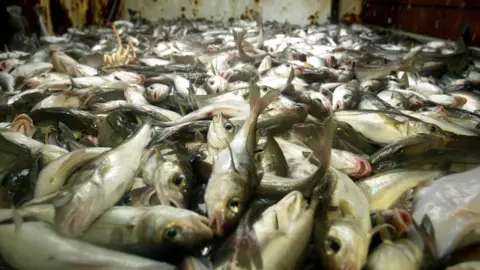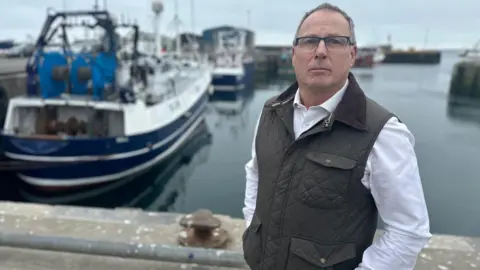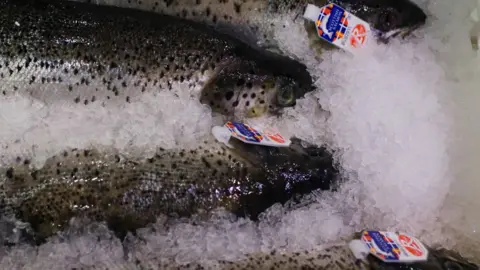 PA Media
PA MediaSome sections of Scotland’s fishing industry have accused Sir Keir Starmer’s government of “capitulating” to the EU over a deal on access to UK waters.
Labour ministers have agreed a 12-year deal which extends existing access for EU boats in exchange for reduced checks and restrictions on food exports.
The agreement was described as “disastrous” by the Scottish Fishermen’s Federation (SFF) while Deputy First Minister Kate Forbes said it was a “great betrayal of our fishing fleet”.
But fish farming body Salmon Scotland welcomed the deal as a “slashing of red tape” which will allow Scottish products and people easier access to the EU.
The prime minister officially announced the deal as part of the first UK-EU summit, describing it as a “win-win”.
He said the fishing agreement would protect UK access with no increase in EU vessels, while other measures meant shellfish could now be sold again in Europe.
The new sanitary and phytosanitary agreement (SPS) would also benefit other agricultural exporters while holidaymakers will be able to use eGates at some airports to cut down on passport queue wait times, Starmer added.
Forbes welcomed closer co-operation which “unpicks a small part of the damage that Brexit continues to inflict”.
But she criticised the lack of consultation with the Scottish government over the fishing deal.
“Given the importance of fishing to Scotland it is also astonishing that the Scottish government was giving no warning of this great betrayal of our fishing fleet,” she said.
 PA Media
PA MediaBut SFF chief executive Elspeth Macdonald said she was worried the agreement would end any “leverage” the UK has in future negotiations.
She told BBC Radio’s Good Morning Scotland programme: “This is not a roll over, it’s a total capitulation to the EU and a disastrous outcome for the Scottish fishing fleet.
“The EU have clearly reneged on a deal that they signed up to in 2020 and have said that they require to have another multi-year deal.
“But in doing so the UK loses all its negotiating capital and all its leverage, so the EU continues to take a far bigger share of the resources in our waters than they are entitled to.
“We’ve always been in this position where fishing seems to be the expendable price for something else that the UK wants.”
Cutting ‘red tape’
While the deal has been criticised, it has also been welcomed in other parts of Scotland’s fishing and food production industries.
Tavish Scott, chief executive of Salmon Scotland, said the new agreement would help cut the time taken to get products into the EU market.
“This breakthrough will ease the burden on our farmers, processors and the communities they support,” he said.
“Scottish salmon is the UK’s largest food export, with strong demand in the EU, the US and beyond.”
The deal also benefits shellfish producers after the EU banned British fishermen from selling live mussels, oysters, clams, cockles and scallops to its member states in 2021.
Under those rules, fishermen were previously not allowed to transport the animals to the EU unless they had already been treated in purification plants.
‘Sold down the river’
Mike Park, chief executive of the Scottish White Fish Association, described the deal as an “utter betrayal”.
He said it was the “third time” the fishing industry had been “sold down the river,” citing decisions by former prime minister Ted Heath, who took the UK into the EU in 1973, and Boris Johnson, who negotiated its exit in the aftermath of Brexit in 2020.
Mr Park said: “We understand the free flow of food products, the EU benefit from that and the UK benefit from it.
“But here we have a massive fleet coming into UK waters and the UK fishing industry gets nothing out of it.”

Scottish Conservative MP for Gordon and Buchan, Harriet Cross, described the deal as a “surrender” and “one of the biggest acts of betrayal that our fishing industry has seen in Scotland.”
She said: “Our fishermen have been used as a pawn by Keir Starmer, which will result in catastrophic consequences for our coastal communities.”
The UK government also announced a £360m fund to invest in coastal communities as part of the agreement.
It said that would go towards new technology and equipment to modernise the fleet, training to upskill workforces and help to “revitalise” coastal communities.
 Getty Images
Getty ImagesAbout 4,000 people are employed in Scotland’s commercial sea fishing industry, according to a Scottish government report published in 2023.
In 2022, it brought £335m into the Scottish economy, more than half of which came from Aberdeenshire, including the UK’s largest fishing port at Peterhead.
The fish farming and aquaculture industries account for about 2,200 jobs and brought in £337m to the Scottish economy in 2022.
In France, Scottish salmon became the first non-French product to carry the “Label Rouge” mark, given to products deemed to be of a “superior quality”.

Keir Starmer has described this UK-EU deal as a “win-win” but that is not necessarily how it is viewed by every part of the Scottish fishing industry.
The sharply contrasting reactions of the Scottish Fishermen’s Federation – which has accused the UK government of “capitulation” – and Salmon Scotland, which has welcomed an agreement it believes will “slash red tape”, underlines the fact that any deal involves trade-offs.
The UK government is trying to offset the disappointment of some in the fishing industry with a £360m fund for coastal communities.
There are aspects of closer cooperation between the UK and EU that the Scottish government is happy to welcome.
However, there was never going to be a package that would satisfy SNP ministers, as they favour a return to the EU.
They argue the best way for that to be achieved is through Scottish independence. But that debate has lost much of its previous energy.
An earlier “reset” in relations between the UK and devolved governments has improved how they work together.
But Scottish ministers argue that they should have been consulted on today’s deal, despite foreign affairs being a matter reserved to Westminster.










